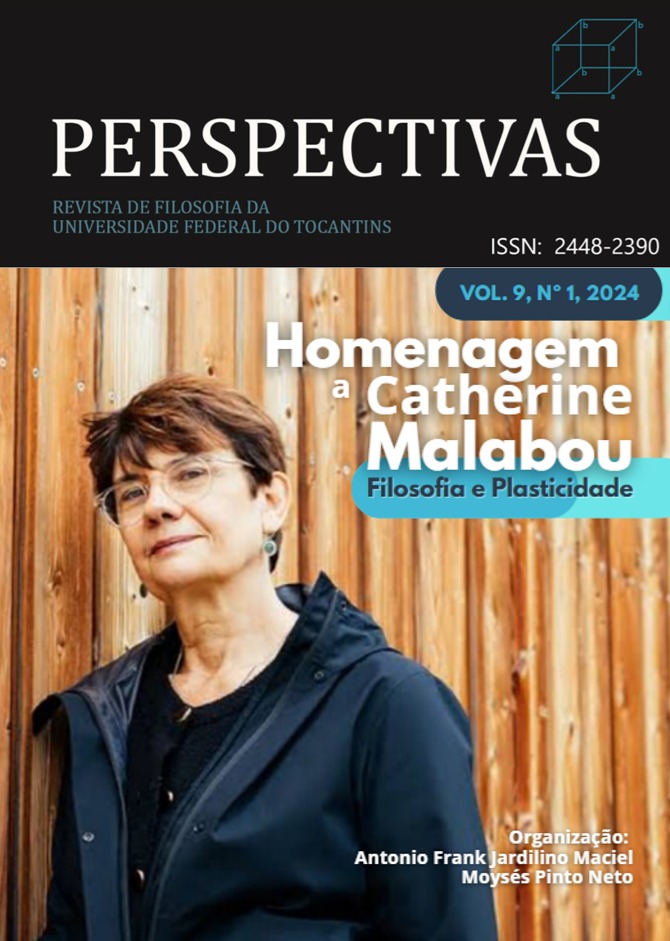Catherine Malabou e a plasticidade
um motivo filosófico para o mundo contemporâneo
DOI:
https://doi.org/10.20873-rpvn9v1-13Palavras-chave:
Plasticidade, Cérebro, Psique., Subjetividade, TransformaçãoResumo
Este artigo analisa o conceito de plasticidade da filósofa francesa Catherine Malabou num diálogo transdisciplinar entre filosofia, neurociência e psicanálise, tal como apresentado nos seus livros Que faire de notre cerveau ? (2004), Les Nouveaux Blessés. De Freud à la neurologie, penser les traumatismes contemporains (2007) e Ontologie de l'accident. Essai sur la plasticité destructrice (2009). O levantamento destas obras nos permite situar o pensamento de Malabou no quadro de uma reflexão materialista que explora a ligação (problemática) entre corpo e mente, ou, mais precisamente, entre cérebro e psique. Argumenta-se que a sua proposta, a partir de uma crítica ao imperativo capitalista que exige uma flexibilidade incessante dos indivíduos, a partir de uma reflexão sobre as consequências identitárias dos acidentes vasculares cerebrais, oferece uma ressignificação radical do sujeito contemporâneo, sugerindo, ao mesmo tempo, formas de ação destinadas a operar mudanças políticas e sociais significativas em resposta à atual crise civilizacional.
Referências
BHANDAR, Brenna and Jonathan Goldberh-Hiller. Plastic Materialities: Politics, Legality, and Metamorphosis in the Work of Catherine Malabou. Durham and London: Duke University Press, 2015.
BUSTOS GAJARDO, Gustavo. “El peso de la materialidad en la escritura y el pensamiento de Jacques Derri-da”, Pensamiento. Revista de Investigación e Información Filosófica 76, núm. 289 (2020): 251–276.
CASTELLANOS, Nazareth. Neurociencia del cuerpo. Cómo el organismo esculpe el cerebro. Barcelona: Editorial Kairós, 2022.
COHEN, Tom Cohen (ed.). Telemorphosis: Theory in the Era of Climate Change. Ann Arbor: Open Press Hu-manities, 2012.
COOLE, Diana, and Samantha Frist (eds.), New Materialisms. Ontology, Agency, and Politics. Durham and London: Duke University Press, 2010.
DAMASIO, Antonio. La sensación de lo que ocurre. Cuerpo y emoción en la construcción de la conciencia. Bar-celona: Editorial Planeta, 2002.
DAMASIO, Antonio. En busca de Spinoza: Neurobiología de la emoción y los sentimientos. Barcelona: Crítica, 2005.
DAMASIO, Antonio. El error de Descartes. La emoción, la razón y el cerebro humano. Barcelona: Planeta, 2018.
DAMASIO, Antonio. Sentir y saber: El camino de la consciencia. Barcelona: Ediciones Destino, 2021.
DERRIDA, Jacques. De la gramatología. México: Siglo XXI Editores, 1971.
ESSLIN, Martin. El teatro del absurdo. Barcelona: Seix Barral, 1966.
GARCÉS, Marina. Escuela de aprendices. Barcelona: Galaxia Gutenberg, 2020.
HARLOW, John Martyn. Recovery from The Passage of an Iron Bar Through The Head. Boston: David Clapp & Son, 1869.
HAUKEDAL, Rasmus Sandnes. “Disturbance and Destruction: The Aetiology of Trauma”, Culture, Theory and Critique 61, no. 1 (2020): 22-36.
JOHNSON, Christopher. System and Writing in the Philosophy of Jacques Derrida. Cambridge: Cambridge Uni-versity Press, 2009.
MACMILLAN, Malcolm. “Restoring Phineas Gage: A 150th Retrospective”, Journal of the History of the Neuro-sciences 9, núm. 1 (2000): 46-66.
MALABOU, Catherine. Plasticité. Paris: Éditions Leo Sheer, 2000.
MALABOU, Catherine. ¿Qué hacer con nuestro cerebro? Madrid: Arena Libros, 2007.
MALABOU, Catherine. Plasticidad en el atardecer de la escritura. Dialéctica, destrucción y deconstrucción. Vi-laboa: Ellago Ediciones, 2008.
MALABOU, Catherine. La plasticidad en espera. Santiago de Chile: Palinodia, 2010.
MALABOU, Catherine. Los nuevos heridos. De Freud a la neurología -pensar los traumatismos contemporáneos. México: Paradiso Editores, 2018.
MALABOU, Catherine. Ontología del accidente. Ensayo sobre la plasticidad destructiva. Santiago: Pólvora Edi-torial, 2022.
MALABOU, Catherine. Plasticity. The Promise of Explotion. Edinburgh: Edinburgh University Press, 2022.
MALABOU, Catherine and Noëlle Vahanian. “A Conversation with Catherine Malabou”, Journal for Cultural and Religious Theory 9, núm. 1 (2008): 1-13.
MASÓ, Joana. “Catherine Malabou: La plasticidad ̶ O cómo cambiar de accidente y alteridad”, en Filosofías Postmetafísicas. 20 años de filosofía francesa contemporánea, Laura Llevadot y Jordi Riba (coords.). Barcelona: Editorial OUC, 2012.
NANCY, Jean-Luc. El intruso. Buenos Aires: Amorrortu, 2006.
PRATI, Renata. “Enfermedad mental y plasticidad. Neurociencias, psicoanálisis y crítica cultural en Catheri-ne Malabou”, Revista de Humanidades 39, (2019): 47-75.
RAMÍREZ-BERMÚDEZ, Jesús. Un diccionario sin palabras y tres historias clínicas. México: Almadía, 2016.
RAMÍREZ-BERMÚDEZ, Jesús. La melancolía creativa. México: Debate, 2022.
RUSSEL, Francis. “Brain Power: Cruel Optimism and Neuro-Liberalism in the Work of Catherine Mala-bou”, Culture, Theory and Critique 61, núm. 1 (2020): 64-78.
SACKS, Oliver. El hombre que confundió a su mujer con un sombrero. Barcelona: Anagrama, 2002.
WATKIN, Christopher. French Philosophy Today. New Figures of the Human in Badiou, Meillassoux, Malabou, Serres and Latour. Edinburgh: Edinburgh University Press, 2016.
WILLIAMS, Tyler M. “Plasticity, in Retrospect: Changing the Future of Humanities”, Diacritics 41, no. 1 (2013): 6-26.
ŽIŽEK, Slavoj. “Descartes and the Post-Traumatic Subject: On Catherine Malabou’s Les Nouveaux blessés and Other Autistic Monsters”, Qui Parle 17, núm. 2 (2009): 123-147.
Downloads
Publicado
Como Citar
Edição
Seção
Licença
Copyright (c) 2024 Ainhoa Suárez Gómez

Este trabalho está licenciado sob uma licença Creative Commons Attribution 4.0 International License.
Os autores que publicam com esta revista concordam com os seguintes termos:
1. Autores mantêm os direitos concedidos à revista ou o direito de primeira publicação com o trabalho licenciado à Atribuição de Licença Creative Commons Atribuição 4.0 Internacional (CC BY 4.0) que permite o compartilhamento de trabalhos com reconhecimento de autoria e publicação inical nesta revista.
2. Autores têm permissão para aceitar contratos, distribuição não exclusiva da versão do trabalho publicada nesta revista (por exemplo, publicarem em repositório institucional ou como capítulo de livro) com reconhecimento de autoria e de publicação inicial nesta revista.
3. Autores têm permissão e são estimulados a publicar e distribuir o seu trabalho on-line (por exemplo, em repositório institucional ou em sua página pessoal) com as devidas referências à revista.





















